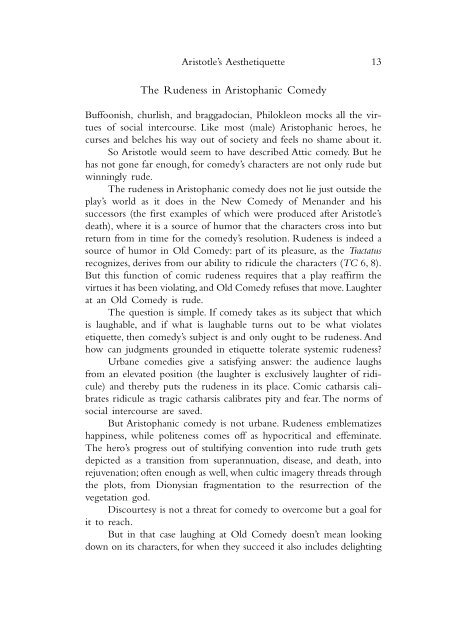You also want an ePaper? Increase the reach of your titles
YUMPU automatically turns print PDFs into web optimized ePapers that Google loves.
Aristotle’s Aes<strong>the</strong>tiquette<br />
The Rudeness in Aristophanic Comedy<br />
Buffoonish, churlish, and braggadocian, Philokleon mocks all <strong>the</strong> virtues<br />
<strong>of</strong> social intercourse. Like most (male) Aristophanic heroes, he<br />
curses and belches his way out <strong>of</strong> society and feels no shame about it.<br />
So Aristotle would seem to have described Attic comedy. But he<br />
has not gone far enough, for comedy’s characters are not only rude but<br />
winningly rude.<br />
The rudeness in Aristophanic comedy does not lie just outside <strong>the</strong><br />
play’s world as it does in <strong>the</strong> New Comedy <strong>of</strong> Menander and his<br />
successors (<strong>the</strong> first examples <strong>of</strong> which were produced after Aristotle’s<br />
death), where it is a source <strong>of</strong> humor that <strong>the</strong> characters cross into but<br />
return from in time for <strong>the</strong> comedy’s resolution. Rudeness is indeed a<br />
source <strong>of</strong> humor in Old Comedy: part <strong>of</strong> its pleasure, as <strong>the</strong> Tractatus<br />
recognizes, derives from our ability to ridicule <strong>the</strong> characters (TC 6, 8).<br />
But this function <strong>of</strong> comic rudeness requires that a play reaffirm <strong>the</strong><br />
virtues it has been violating, and Old Comedy refuses that move. Laughter<br />
at an Old Comedy is rude.<br />
The question is simple. If comedy takes as its subject that which<br />
is laughable, and if what is laughable turns out to be what violates<br />
etiquette, <strong>the</strong>n comedy’s subject is and only ought to be rudeness. And<br />
how can judgments grounded in etiquette tolerate systemic rudeness?<br />
Urbane comedies give a satisfying answer: <strong>the</strong> audience laughs<br />
from an elevated position (<strong>the</strong> laughter is exclusively laughter <strong>of</strong> ridicule)<br />
and <strong>the</strong>reby puts <strong>the</strong> rudeness in its place. Comic catharsis calibrates<br />
ridicule as tragic catharsis calibrates pity and fear. The norms <strong>of</strong><br />
social intercourse are saved.<br />
But Aristophanic comedy is not urbane. Rudeness emblematizes<br />
happiness, while politeness comes <strong>of</strong>f as hypocritical and effeminate.<br />
The hero’s progress out <strong>of</strong> stultifying convention into rude truth gets<br />
depicted as a transition from superannuation, disease, and death, into<br />
rejuvenation; <strong>of</strong>ten enough as well, when cultic imagery threads through<br />
<strong>the</strong> plots, from Dionysian fragmentation to <strong>the</strong> resurrection <strong>of</strong> <strong>the</strong><br />
vegetation god.<br />
Discourtesy is not a threat for comedy to overcome but a goal for<br />
it to reach.<br />
But in that case laughing at Old Comedy doesn’t mean looking<br />
down on its characters, for when <strong>the</strong>y succeed it also includes delighting<br />
13
















